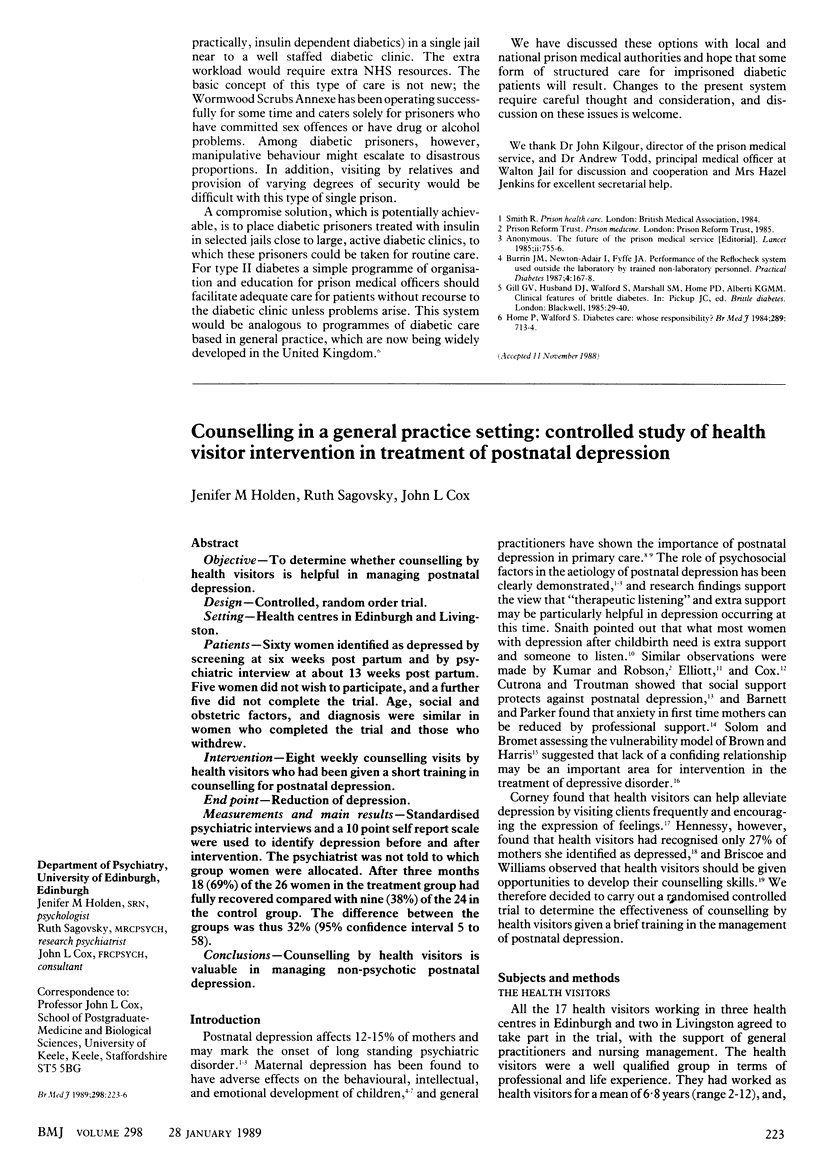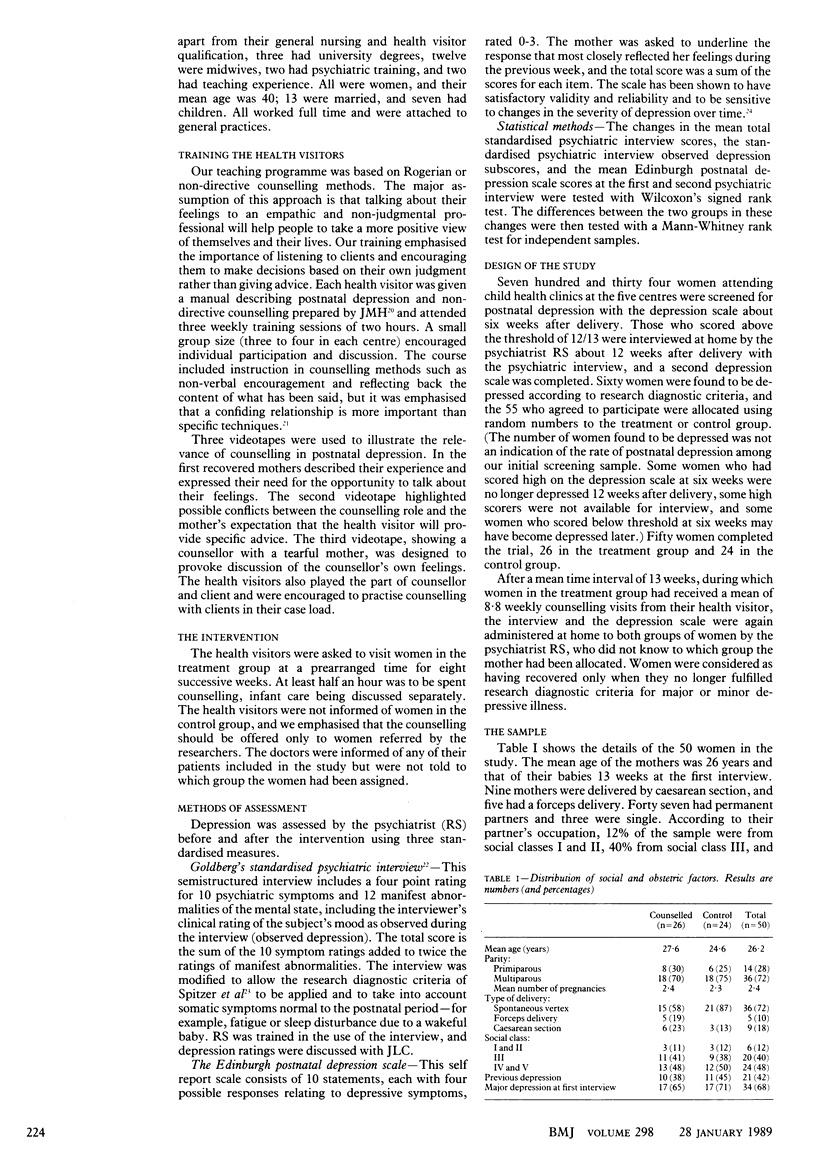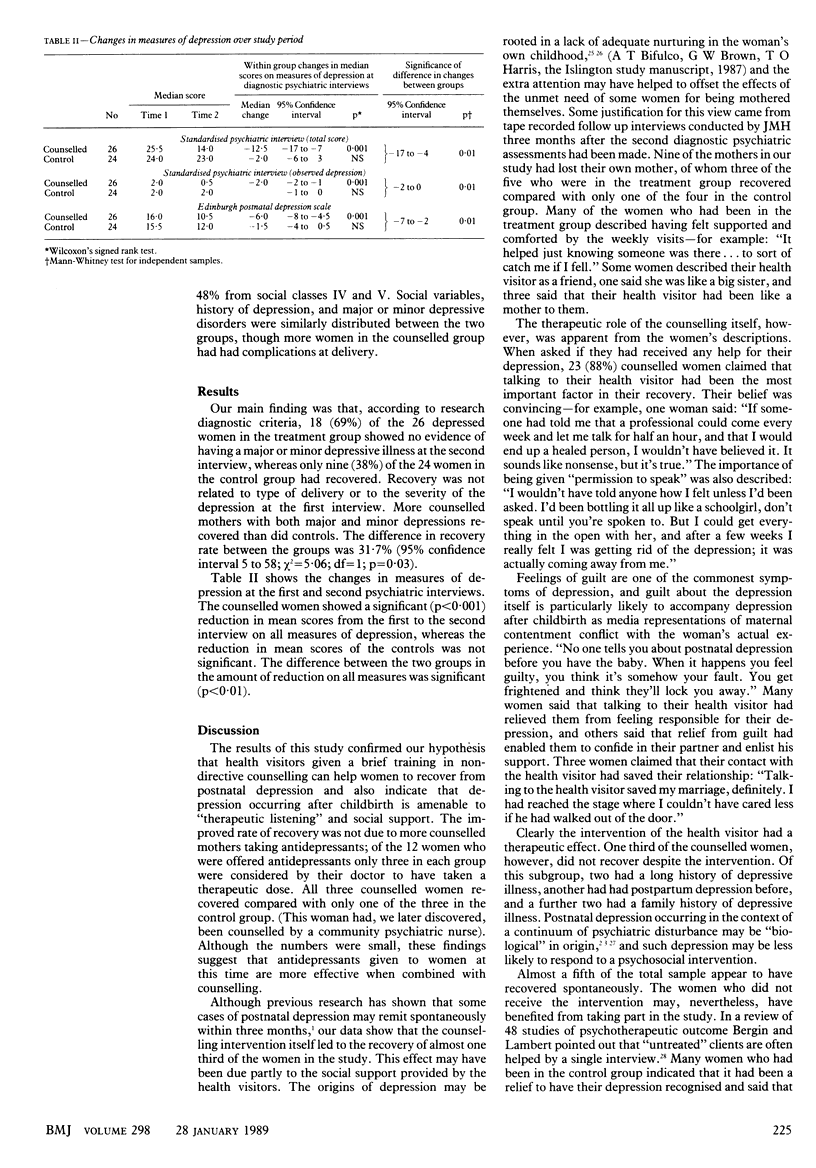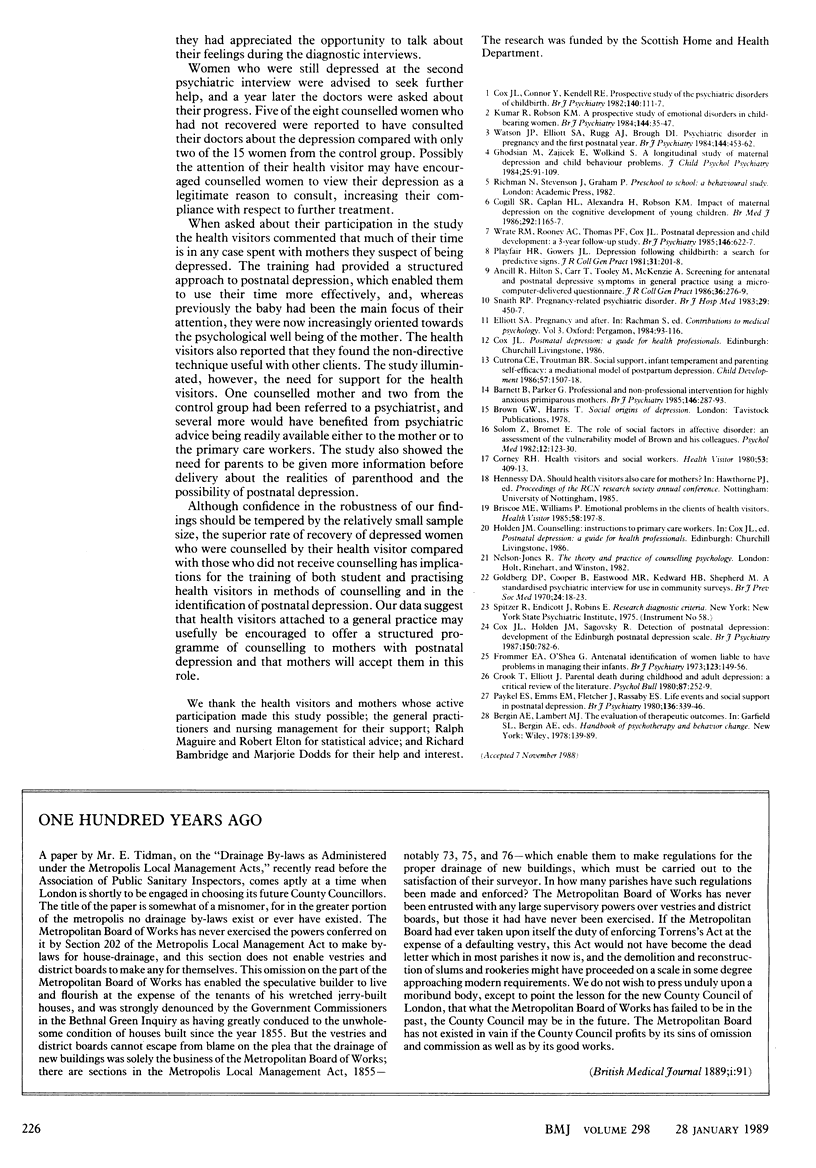Abstract
OBJECTIVE--To determine whether counselling by health visitors is helpful in managing postnatal depression. DESIGN--Controlled, random order trial. SETTING--Health centres in Edinburgh and Livingston. PATIENTS--Sixty women identified as depressed by screening at six weeks post partum and by psychiatric interview at about 13 weeks post partum. Five women did not wish to participate, and a further five did not complete the trial. Age, social and obstetric factors, and diagnosis were similar in women who completed the trial and those who withdrew. INTERVENTION--Eight weekly counselling visits by health visitors who had been given a short training in counselling for postnatal depression. END POINT--Reduction of depression. MEASUREMENTS and main results--Standardised psychiatric interviews and a 10 point self report scale were used to identify depression before and after intervention. The psychiatrist was not told to which group women were allocated. After three months 18 (69%) of the 26 women in the treatment group had fully recovered compared with nine (38%) of the 24 in the control group. The difference between the groups was thus 32% (95% confidence interval 5 to 58). CONCLUSIONS--Counselling by health visitors is valuable in managing non-psychotic postnatal depression.
Full text
PDF



Selected References
These references are in PubMed. This may not be the complete list of references from this article.
- Ancill R., Hilton S., Carr T., Tooley M., McKenzie A. Screening for antenatal and postnatal depressive symptoms in general practice using a microcomputer-delivered questionnaire. J R Coll Gen Pract. 1986 Jun;36(287):276–279. [PMC free article] [PubMed] [Google Scholar]
- Barnett B., Parker G. Professional and non-professional intervention for highly anxious primiparous mothers. Br J Psychiatry. 1985 Mar;146:287–293. doi: 10.1192/bjp.146.3.287. [DOI] [PubMed] [Google Scholar]
- Cogill S. R., Caplan H. L., Alexandra H., Robson K. M., Kumar R. Impact of maternal postnatal depression on cognitive development of young children. Br Med J (Clin Res Ed) 1986 May 3;292(6529):1165–1167. doi: 10.1136/bmj.292.6529.1165. [DOI] [PMC free article] [PubMed] [Google Scholar]
- Cox J. L., Connor Y., Kendell R. E. Prospective study of the psychiatric disorders of childbirth. Br J Psychiatry. 1982 Feb;140:111–117. doi: 10.1192/bjp.140.2.111. [DOI] [PubMed] [Google Scholar]
- Cox J. L., Holden J. M., Sagovsky R. Detection of postnatal depression. Development of the 10-item Edinburgh Postnatal Depression Scale. Br J Psychiatry. 1987 Jun;150:782–786. doi: 10.1192/bjp.150.6.782. [DOI] [PubMed] [Google Scholar]
- Crook T., Eliot J. Parental death during childhood and adult depression: a critical review of the literature. Psychol Bull. 1980 Mar;87(2):252–259. [PubMed] [Google Scholar]
- Cutrona C. E., Troutman B. R. Social support, infant temperament, and parenting self-efficacy: a mediational model of postpartum depression. Child Dev. 1986 Dec;57(6):1507–1518. [PubMed] [Google Scholar]
- Frommer E. A., O'Shea G. Antenatal identification of women liable to have problems in managing their infants. Br J Psychiatry. 1973 Aug;123(573):149–156. doi: 10.1192/bjp.123.2.149. [DOI] [PubMed] [Google Scholar]
- Ghodsian M., Zajicek E., Wolkind S. A longitudinal study of maternal depression and child behaviour problems. J Child Psychol Psychiatry. 1984 Jan;25(1):91–109. doi: 10.1111/j.1469-7610.1984.tb01721.x. [DOI] [PubMed] [Google Scholar]
- Goldberg D. P., Cooper B., Eastwood M. R., Kedward H. B., Shepherd M. A standardized psychiatric interview for use in community surveys. Br J Prev Soc Med. 1970 Feb;24(1):18–23. doi: 10.1136/jech.24.1.18. [DOI] [PMC free article] [PubMed] [Google Scholar]
- Kumar R., Robson K. M. A prospective study of emotional disorders in childbearing women. Br J Psychiatry. 1984 Jan;144:35–47. doi: 10.1192/bjp.144.1.35. [DOI] [PubMed] [Google Scholar]
- Paykel E. S., Emms E. M., Fletcher J., Rassaby E. S. Life events and social support in puerperal depression. Br J Psychiatry. 1980 Apr;136:339–346. doi: 10.1192/bjp.136.4.339. [DOI] [PubMed] [Google Scholar]
- Playfair H. R., Gowers J. I. Depression following childbirth--a search for predictive signs. J R Coll Gen Pract. 1981 Apr;31(225):201–208. [PMC free article] [PubMed] [Google Scholar]
- Snaith R. P. Pregnancy-related psychiatric disorder. Br J Hosp Med. 1983 May;29(5):450, 452, 454-6. [PubMed] [Google Scholar]
- Solomon Z., Bromet E. The role of social factors in affective disorder: an assessment of the vulnerability model of Brown and this colleagues. Psychol Med. 1982 Feb;12(1):123–130. doi: 10.1017/s0033291700043361. [DOI] [PubMed] [Google Scholar]
- Watson J. P., Elliott S. A., Rugg A. J., Brough D. I. Psychiatric disorder in pregnancy and the first postnatal year. Br J Psychiatry. 1984 May;144:453–462. doi: 10.1192/bjp.144.5.453. [DOI] [PubMed] [Google Scholar]
- Wrate R. M., Rooney A. C., Thomas P. F., Cox J. L. Postnatal depression and child development. A three-year follow-up study. Br J Psychiatry. 1985 Jun;146:622–627. doi: 10.1192/bjp.146.6.622. [DOI] [PubMed] [Google Scholar]


